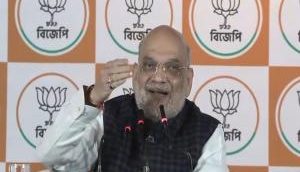
On 7 February, in an official statement,Tamil Nadu Chief Minister J Jayalalithaa announced to the world what could have well been the first death of a human being by an extraterrestrial object. In her statement, she blamed a meteorite for the death of a man on the premises of a private engineering college in Vellore district the day before.
"A mishap occurred yesterday when a meteorite fell in the campus of a private engineering college in Vellore district's K Pantharappalli village," she said, adding that she had ordered the district administration and hospital officials to offer the best treatment to the three injured in the incident.
However, now there is proof that Amma may be wrong. According to NASA scientists, the pictures of the depression left behind by the suspected meteorite at the college campus resembled "a land based explosion" and not with something from space, the New York Times reported.
Lindley Johnson, NASA's planetary defence officer was quoted by the NYT saying that "a death by meteorite impact was so rare that one has never been scientifically confirmed in recorded history".
NASA also argued that meteorites are often cool to the touch when they land, so that snuffs the possibility of an explosion. Further, the size and weight of the object recovered from the site was too light to have caused an explosion.
What really happened?
Window panes of Bharatidasan Engineering College buses and several glass planes of its building had been damaged when the object said to be a meteorite by the state government fell, causing a loud explosion and leaving a small crater near the college complex. The deceased, a college bus driver named Kamaraj was walking past the building at that time. The injured were employed as gardeners. None of the students, who were attending classes at that time, were injured.
The police initially probed a terror angle, but as a senior officer told The Indian Express, they couldn't find any trace of an explosive or grenade which could have caused the blast. Finally, the officer said, they concluded it was the result of a meteorite fall, with the help of a senior scientist who was camping in Vellore due to a similar incident which had occurred two weeks ago.
"Following a similar incident near Vellore on 26 January, on a paddy field in Alangayam village, a scientist from National Physical Laboratory had been camping near Vellore. When our bomb and explosives experts ruled out the presence of usual chemicals and explosive contents, it was the scientist who visited the campus and confirmed that it was an incident caused by a meteorite," the officer said.
While there have been claims earlier of meteorites proving fatal, including in the 20th century, there is no official confirmation of the same except for a cow that came under one in Venezuela in 1972, was struck dead, and quickly eaten. In 2007, the killer meteorite, which came to be used as a doorstop, was put up for auction. At the time, The Telegraph said the Valera meteorite fragment "holds the dubious distinction of being the only extra-terrestrial rock to have caused a death".
Can meteorite kill human beings?
The only confirmed human meteorite victim in history so far has been Ann Hodges, who was hit in her Alabama home in 1954 and survived.
The most famous and researched incident involving meteorites in the recent past was in Chelyabinsk in 2013. While the powerful shock wave from the meteor damaged buildings, shattered glass and left hundreds injured, there were no deaths.
The odds of being killed by an asteroid impact, as per experts? Between 1 in 700,000 and 1 in 250 million.
The family of Kamaraj, whose luck ran out Saturday, gets Rs 1 lakh from the Chief Minister's Public Relief Fund.
(With PTI inputs)
First published: 10 February 2016, 5:29 IST






![BJP's Kapil Mishra recreates Shankar Mahadevan’s ‘Breathless’ song to highlight Delhi pollution [WATCH] BJP's Kapil Mishra recreates Shankar Mahadevan’s ‘Breathless’ song to highlight Delhi pollution [WATCH]](https://images.catchnews.com/upload/2022/11/03/kapil-mishra_240884_300x172.png)

![Anupam Kher shares pictures of his toned body on 67th birthday [MUST SEE] Anupam Kher shares pictures of his toned body on 67th birthday [MUST SEE]](https://images.catchnews.com/upload/2022/03/07/Anupam_kher_231145_300x172.jpg)






